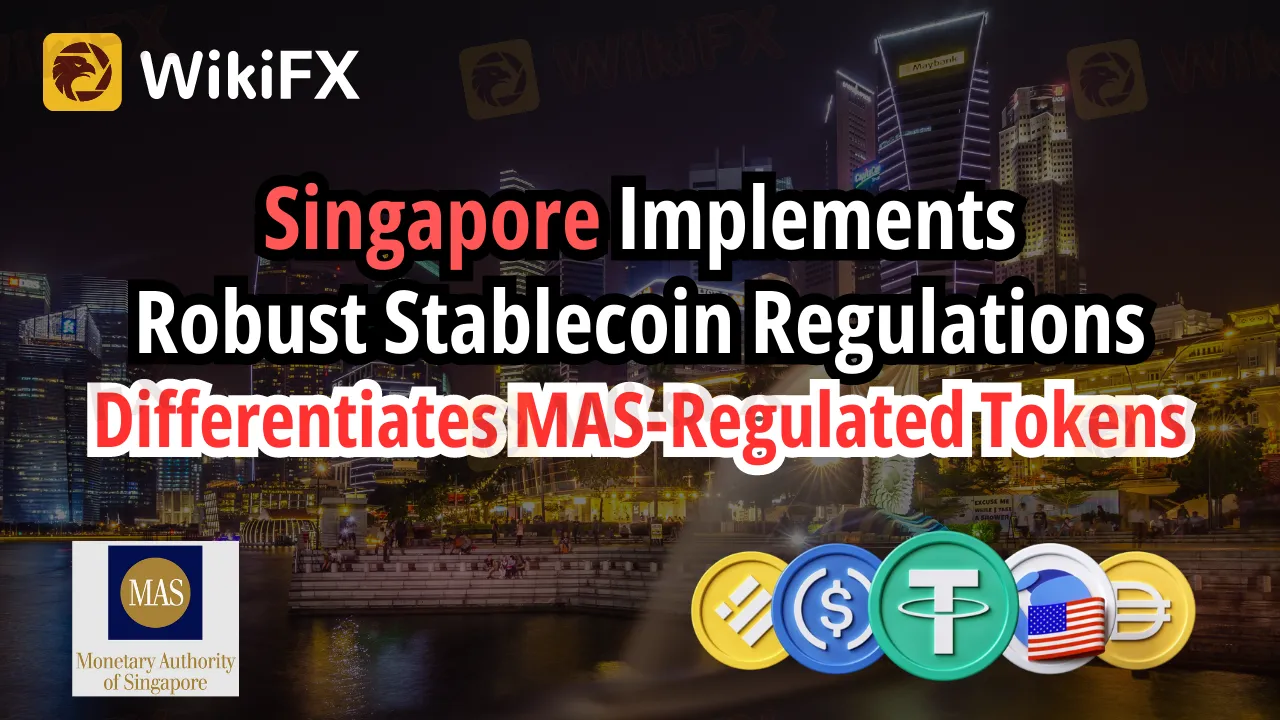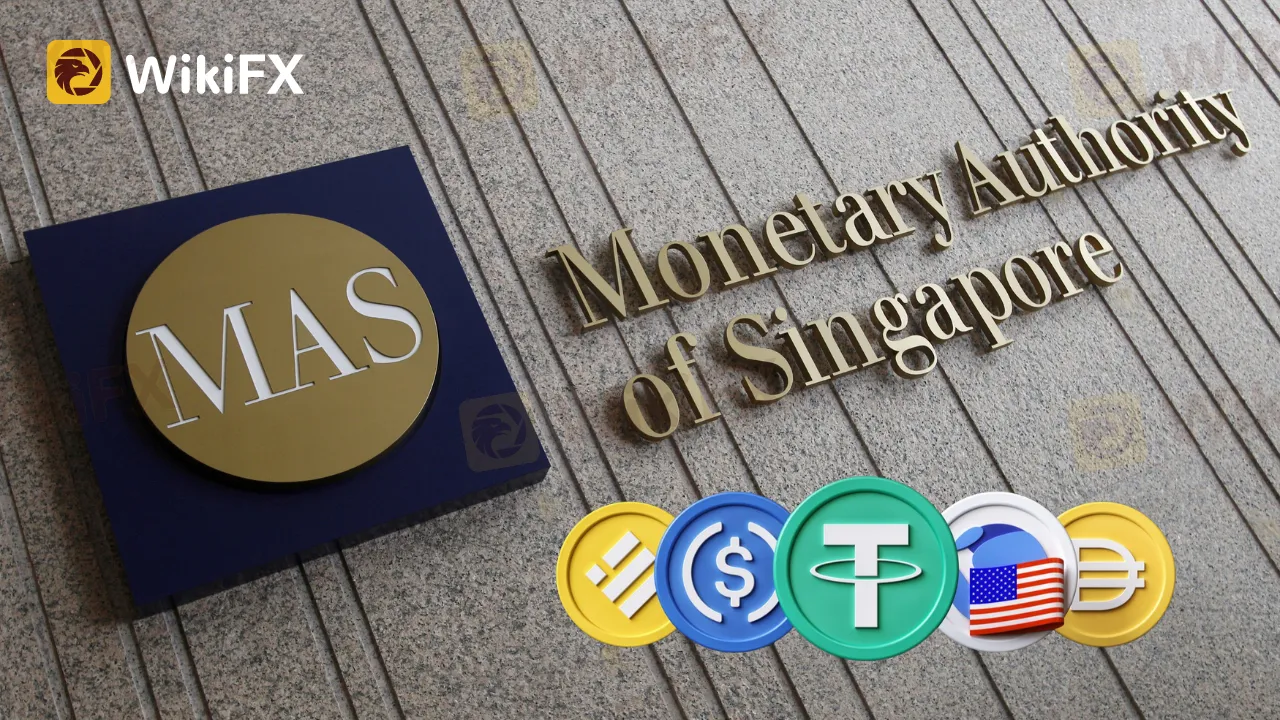简体中文
繁體中文
English
Pусский
日本語
ภาษาไทย
Tiếng Việt
Bahasa Indonesia
Español
हिन्दी
Filippiiniläinen
Français
Deutsch
Português
Türkçe
한국어
العربية
Singapore Implements Robust Stablecoin Regulations, Differentiates MAS-Regulated Tokens
Abstract:Singapore's MAS introduces strict guidelines for stablecoins, ensuring value stability and fostering trust in the digital currency ecosystem.

Singapore — The Monetary Authority of Singapore (MAS), in its latest move to ensure a sound and resilient digital currency ecosystem, has released detailed guidelines targeted at stablecoins. These regulations are in line with ensuring that the value stability of each stablecoin released in the city-state is preserved.
In a bid to bolster the digital payment landscape, the MAS stipulates that issuers desiring their stablecoins to be tagged “MAS-regulated” must adhere to a set of predefined standards. The introduction of these norms comes after extensive public consultation undertaken in October 2022.
For the unversed, stablecoins are unique digital payment tokens that pledge to retain a steady value in comparison to one or several specified fiat currencies. MAS, in its press release, highlighted, “Stablecoins, when meticulously regulated, can act as a trusted medium of exchange, fostering innovation and facilitating on-chain transactions of digital assets.”

The MAS regulations cover stablecoins, specifically single-currency stablecoins (SCS), tied to the Singapore dollar or any top-tier G10 currencies. Some of the most notable among these currencies include the U.S. dollar, the euro, the Japanese yen, and the Swiss franc.
To obtain the “MAS-regulated stablecoins” accreditation, issuers must meet benchmarks in areas pivotal to the soundness of the financial ecosystem, such as value stability, capital adequacy, and a clear redemption procedure.
Key highlights of the regulations include:
Composition and Valuation: The reserve assets for these stablecoins will undergo stringent requirements related to their composition, valuation, custody, and even audit processes. This is to cement their value stability.
Capital Adequacy: Issuers are expected to uphold minimum base capital and liquid assets, which will act as buffers against insolvency risks.
Redemption: On receiving a redemption request, issuers are mandated to return the par value of SCS to its holders within a time frame of five business days.
Transparency: A vital component, issuers will need to lucidly inform users about the value stabilizing mechanisms in place, the rights of the stablecoin holders, and findings from audits of the reserve assets.
One of the prominent features of this label is its potential to enable users to distinguish between MAS-regulated stablecoins and other digital payment tokens.

Ho Hern Shin, the Deputy Managing Director for Financial Supervision at MAS, passionately spoke on the regulations, emphasizing their role in cementing stablecoins as a “reliable digital medium of exchange”. The regulations also act as a bridge connecting the fiat and digital asset worlds. She further reminisced about the past year when the city-state witnessed the unfortunate collapse of stablecoin terrausd and cryptocurrency luna by the Singapore-based Terraform Labs. This incident was a poignant reminder of the necessity of robust financial regulations.
Following on the heels of the new regulations for crypto service providers launched in July, these stablecoin guidelines reinforce Singapores position at the forefront of digital currency governance.
To remain abreast with the evolving financial landscape and related news, users are advised to download the WikiFX App, available at: https://www.wikifx.com/en/download.html.

Disclaimer:
The views in this article only represent the author's personal views, and do not constitute investment advice on this platform. This platform does not guarantee the accuracy, completeness and timeliness of the information in the article, and will not be liable for any loss caused by the use of or reliance on the information in the article.
Read more

Visa and Coinbase Partner for Instant Crypto Transfers in US, EU
Visa and Coinbase launch instant crypto deposit and withdrawal for U.S. and EU debit cardholders, enabling seamless transactions and boosting accessibility in crypto.

Alameda Sues KuCoin to Reclaim $50M in FTX Asset Recovery Drive
Alameda Research, a subsidiary of the defunct cryptocurrency exchange FTX, has recently filed a lawsuit against KuCoin in the U.S. Bankruptcy Court for the District of Delaware. This legal move aims to recover more than $50 million in assets that Alameda claims are part of the FTX estate.

Tether Holds $100 Billion in US Treasuries Amid Regulatory Scrutiny
Tether CEO Paolo Ardoino reveals the company's $100 billion in US Treasuries, defending against regulatory scrutiny following recent allegations.

Illegal Bitcoin Mining Is Draining Millions from Malaysia’s National Company
Malaysia’s national electricity provider, Tenaga Nasional Berhad (TNB), recently disclosed that it has incurred losses surpassing RM440 million (approximately $101 million) as a result of electricity theft linked to illegal Bitcoin mining operations
WikiFX Broker
Latest News
Angel One is an Ideal choice for you ?
StoneX Group Strengthens Indian Presence with Bullion Exchange Membership & New Offices
6 Trading Platforms That May Put Your Money at Risk
Indonesian Woman Lured into S$1.3 Million Forex Scam by Friend
Be a part of SquaredFinancial Live Talk show on US Election
FCA fines personnel £350,000 for failing to notify the FCA of significant tax issues
Broker Review: Is Sure FX Reliable?
ATTENTION! WARNING AGAINST FRAUD BROKERS
FOREX.com Partners with Kalshi for Event-Based Trading on US Election
Alameda Sues KuCoin to Reclaim $50M in FTX Asset Recovery Drive
Currency Calculator


